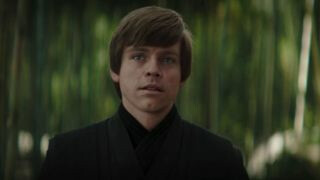A Tatooine of Nostalgia
February 10, 2022 | Jim Angehr
Even though I’m in many ways its target audience, I find The Book of Boba Fett to be deeply weird. This seven episode miniseries on Disney+ features a main character created over 40 years ago (Boba Fett), who boondoggles on a planet created over 40 years ago (Tatooine), which means that it’s likewise aimed at human beings created over 40 years ago (me).
However, as Yoda always says, “Go home again, you cannot.”
I’ll allow that Boba Fett sprinkles in some new faces, but it’s nevertheless a yoooge nostalgia-fest. If this Star Wars galaxy of far, far away is truly immense, why do we keep going back to Tatooine?
The tipping point for me was episode 6, in which we reconnected with––spoiler alert!––Grogu (a.k.a. “baby Yoda,” a.k.a. “the search for more money”) and a seemingly 30-something Luke Skywalker that’s played by a de-aged Mark Hamill.
This wasn’t the first time we've met a CGI-botoxed Mark Hamill, since he previously swooped in––SPOILER ALERT!––at the end of The Mandalorian’s last season in order to rescue Grogu from his evidently kind, loving, and supportive adoptive father. (Apparently saving kids from great family situations is the Jedi way. Because reasons!) For this first “young” Luke appearance, fans balked because a de-aged Mark Hamill looked unfortunately like a dead Mark Hamill: sure, Skywalker no longer looked like old Hamill, but he didn’t exactly look like a living Hamill, either. He instead gave off a waxen and pixelated, late oughts video game vibe.

The latest installment of CGI Luke from The Book of Boba Fett greatly improved the visuals from his first outing, to the point that at least occasionally it seemed as if a truly younger Mark Hamill was acting the part. But here’s the thing. Using digital brushwork that buffs a 70 year old Mark Hamill back to a 30 year old Mark Hamill is all the more creepy, precisely because we know that Mark Hamill is 70 years old. Common sense would dictate that the role be recast, but the nostalgia force is too strong with this one.
Nevertheless, even if I’m grousing about the fanboy service of a Disney-fried Star Wars universe, there’s a disturbance in my own force as I realize that over the last few years, I’ve been sucked into my own Sarlaac Pit of nostalgia in multiple ways. Roughly speaking, of my last 50 or so album purchases, probably only 5 of them contain music recorded within the last ten years. For fiction, I’m finding myself sluggish when it comes to checking out new authors; why not just read another Saul Bellow joint? And even with current novels, I’m more likely to pick up a book by an writer I’ve already read than to jump into something by an unfamiliar one.
Perhaps representing the apotheosis of my nostalgia act is my new reading project, Giacomo Leopardi’s Zibaldone. It’s a nonfiction work of philosophy and philology that’s a) old (i.e., written in the early 1800’s), b) long (and will therefore keep me from reading lots of other things, and c) offers as its central thesis that life and literature peaked with Homer (c. 8th century B.C.) and has tumbled downhill ever since.
Why do I, why do we, so easily fall back into nostalgia? That’s the question.
Laziness is undoubtedly a big part of it. Old dogs, new tricks, etc., etc.
At least for me, though, nostalgia also serves as a buffer against fearful cynicism. In my heart of hearts, I can often wonder, “Will things actually ever get better, or just worse and worse?,” and most of the time, to ask the question is to have that answer.
Faith has never been easy for me. I’m always stretched by it, and that’s in large part because the Christian story directly presses against my pessimism. Within the framework of the Bible, we now live “between the ages” in which the kingdom of God––that which brings with it wholeness, life, forgiveness––has dawned but won’t be completed until Jesus returns. Accordingly, as we toil through our days it shouldn’t surprise us that life is as difficult as it is; in many ways, our time on earth in fact can and will get worse. But decay and evil aren’t the end of the story. Rather, a new heavens and earth are coming in which every tear will be wiped away and death itself destroyed.
In the meantime, followers of Jesus are challenged to live with a primary orientation toward the future, and not toward the past. “We are citizens of heaven,” the apostle Paul writes to the Philippian church, “and we await a savior from there, the Lord Jesus Christ, who will transform our bodies to be like his glorious body.”
Here’s to fighting the good fight against the tractor beam of nostalgia. It’s ok to say that The Book of Boba Fett kind of sucks.
